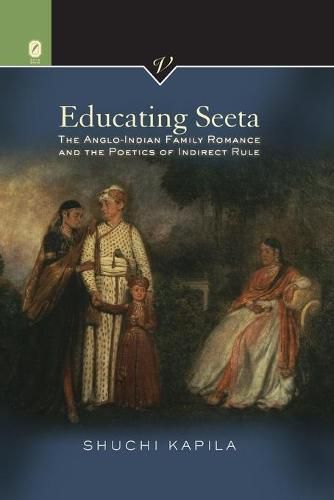Readings Newsletter
Become a Readings Member to make your shopping experience even easier.
Sign in or sign up for free!
You’re not far away from qualifying for FREE standard shipping within Australia
You’ve qualified for FREE standard shipping within Australia
The cart is loading…






This title is printed to order. This book may have been self-published. If so, we cannot guarantee the quality of the content. In the main most books will have gone through the editing process however some may not. We therefore suggest that you be aware of this before ordering this book. If in doubt check either the author or publisher’s details as we are unable to accept any returns unless they are faulty. Please contact us if you have any questions.
Even though Edward Said’s Orientalism inspired several generations of scholars to study the English novel’s close involvement with colonialism, they have not considered how English novels themselves were radically altered by colonialism. In Educating Seeta, Shuchi Kapila argues that the paradoxes of indirect rule in British India were negotiated in family romances which encoded political struggle in the language of domestic and familial civility. A mixture of domestic ideology and liberal politics, these are Anglo-Indian romances, written by British colonials who lived in India during a period of indirect colonial rule. Instead of providing neat conclusions and smooth narratives, they become a record of the limits of liberal colonialism. They thus offer an important supplement to Victorian novels, extend the study of nineteenth-century domestic ideology, and offer a new perspective on colonial culture. Kapila demonstrates that popular writing about India and, by implication, other colonies is an important supplement to the high Victorian novel and indispensable to our understanding of nineteenth-century English literature and culture. Her nuanced study of British writing about indirect rule in India will reshape our understanding of Victorian domestic ideologies, class formation, and gender politics.
$9.00 standard shipping within Australia
FREE standard shipping within Australia for orders over $100.00
Express & International shipping calculated at checkout
This title is printed to order. This book may have been self-published. If so, we cannot guarantee the quality of the content. In the main most books will have gone through the editing process however some may not. We therefore suggest that you be aware of this before ordering this book. If in doubt check either the author or publisher’s details as we are unable to accept any returns unless they are faulty. Please contact us if you have any questions.
Even though Edward Said’s Orientalism inspired several generations of scholars to study the English novel’s close involvement with colonialism, they have not considered how English novels themselves were radically altered by colonialism. In Educating Seeta, Shuchi Kapila argues that the paradoxes of indirect rule in British India were negotiated in family romances which encoded political struggle in the language of domestic and familial civility. A mixture of domestic ideology and liberal politics, these are Anglo-Indian romances, written by British colonials who lived in India during a period of indirect colonial rule. Instead of providing neat conclusions and smooth narratives, they become a record of the limits of liberal colonialism. They thus offer an important supplement to Victorian novels, extend the study of nineteenth-century domestic ideology, and offer a new perspective on colonial culture. Kapila demonstrates that popular writing about India and, by implication, other colonies is an important supplement to the high Victorian novel and indispensable to our understanding of nineteenth-century English literature and culture. Her nuanced study of British writing about indirect rule in India will reshape our understanding of Victorian domestic ideologies, class formation, and gender politics.